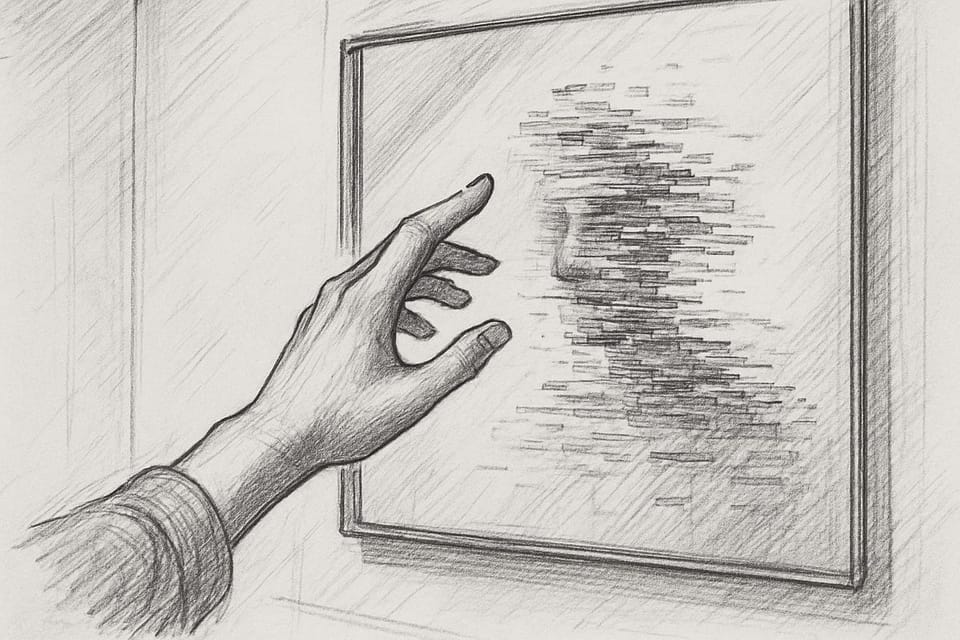
AI isn’t soulless. It just shows us what instant gratification does to craft.
Technology doesn’t steal our humanity. It just reflects what we value most, and what we’re willing to let go.
We craved superpowers, and innovation became our magic wand. With a single promise: faster, easier, and instant access. We ignited our journey. We thirsted for speed, craved productivity, and demanded instant access.
Guess what? We got it!
AI spins up code and words in an instant. It conjures art with a flick of a wrist and answers any query at the speed of thought. It’s a dream come true for our culture that’s always hustling and always connected.
So why does it feel like a nightmare to some? Why the complaints that these AI creations lack “soul” or authenticity? It’s strange. We wanted smooth creativity and productivity. Now that we have it, we say everything feels too robotic. We’re holding up our end of the bargain, racing ahead, only to gripe that the ride feels empty.
The soullessness we’re seeing isn’t an AI problem at all. It’s a mirror held up to the speed-addicted society that summoned it.
A Brief History of Our Impatience
This isn’t the first time we’ve experienced whiplash from exactly what we asked for. A quick rewind:
Personal Computers
In the ’80s and ’90s, PCs aimed to increase productivity. They promised to save time on tasks like writing and accounting. We leapt at them. Not long after, people started to miss handwriting. They felt cut off from working on screens. Many also found word-processed documents to be “soulless” and too uniform. Sound familiar? We chased efficiency and then missed the personal touch.
Smartphones
We craved 24/7 connectivity and got it. We now have the world in our pockets. We often grumble about distractions. We miss face-to-face connections. We also feel the loss of boredom and solitude. We insisted on being everywhere, all the time; now we lament that nothing feels present.
Same-Day Shipping
We hailed the era of instant gratification. (Truthfully, I’ve never experienced online shopping with same-day delivery in Malaysia, but it’s a familiar story elsewhere.) Order this morning, get it by evening. Then we worry that we’re spoiled, that local craft and patience are dying. Convenience won, but at the cost of our appreciation for slow workmanship.
Social Media
We wanted reach and speed. The ability to broadcast our lives and consume others’ content in real time. We got global platforms and viral content. Soon after, we began to crave “authenticity.” We criticized how shallow and curated everything felt. Yet who drove it to this pace? Us.
Uber & On-Demand Everything
No more waiting, no more planning ahead. Tap and go. We celebrated how technology bent the world to our schedules. Then came the hangover. People complained about gig work exploitation. They missed the charm of the old ways, like chatting with a regular taxi driver or cooking at home.
In each case, we accelerated life. We pushed the pedal of progress to the floor. And each time, once the novelty wore off, we started longing for the very friction we had removed. The pattern is clear. We want speed and convenience, but then we miss the “soul” and character that go with it.
AI is the most recent and significant advancement. It delivers content and solutions at Formula 1 speeds. And the backlash comes: “It’s soulless! It’s too generic! It lacks the human touch!” This is history rhyming with itself. We’ve seen this movie before. The problem isn’t the technology itself. It’s our need to rush ahead without considering what we lose.
The Tool is Not the Skill (It’s the Driver, Not the Car)
Let’s address the greatest fear in the domain I know best: “AI will replace human skill and creativity.” I’m a tech lead based in Malaysia who has spent the last decade building software with teams. I’ve heard the worries in my industry and beyond. And I’ve also seen something remarkable: AI doesn’t replace your skill. It reveals it. It magnifies the discipline (or lack thereof) of the person behind the wheel.
Let’s use this as an analogy. Think of AI like a race car or a massive power tool. In the hands of a Formula 1 driver, a faster car sets new records. In the hands of a new driver, that car can result in a big crash. The speed itself isn’t the culprit; the driver’s skill and judgment are. In fact, human error, not the car, causes 94% of car crashes. The speed doesn’t cause chaos. The lack of skill and self-control does.
If we’re blaming the car every time someone crashes, we should ask who handed them the keys.
So, it’s the same with AI. An experienced coder uses an AI assistant to handle tedious tasks and spot edge cases. Their creativity gets a boost. Someone who skips the fundamentals and leans on the tool alone? They get messy code—fast. The AI doesn’t care. It just accelerates what’s already there. Garbage in, garbage out. Faster.
As a team lead, I’ve made it a mantra. My team uses AI as a lever, not a crutch. I won’t trust important code to anyone who can’t write it without AI. The tool is never the skill. If you can’t explain what the AI is doing, you’re not moving faster. You’re headed for a ditch. AI makes your habits more obvious. If you’re sharp and disciplined, it lifts you higher. If you’re not, it just drags you down, only quicker.
That’s coding. But the pattern shows up everywhere AI touches human work.
People grumble about AI in art, design, and music. “It all feels soulless. It’s bland. It’s copy-paste.” Maybe so. But let’s turn that question around. If you give someone the best tools in the world and the work is still generic, is it the tool’s fault? Or is it the pilot’s?
When Quality Slips, Blame the Pilot—Not the Plane
Many people complain about AI in creative fields. They say it creates junk: bland writing, buggy code, and copied designs. It’s soulless! Let’s flip that lens a bit. If someone uses a state-of-the-art tool and still churns out junk, what does that say about them?
Think about coding. Before AI, bad developers wrote bad code all by themselves. There was plenty of it. Stack Overflow didn’t write your program. It showed if you knew how to use the information. A good developer learned and improved. A lazy one copy-pasted answers. This led to a big mess. The same is happening with AI. Bad code committed to your repository isn’t caused by Copilot or ChatGPT. It’s caused by lazy oversight and a lack of fundamentals. The tool makes it clear, and some folks dislike the reflection of their craft.
The truth is, craft still matters. It matters even more now. Those who care about quality will use AI to go deeper, not shallower. They’ll try new ideas, look for other options, and make time to refine the tough sections. I’ve seen designers use generative tools to create 5 variations of a concept. They would usually sketch only one. The final design ends up being much better. I’ve also seen folks hit “randomize” on an AI art generator and settle for the first generic image it spits out. The difference isn’t the AI; it’s the person using it.
We often romanticize the careful coder, the novelist tapping away on a typewriter, and the designer drawing by hand. Thinking that using AI spoils the true nature of their work. But let’s be real: mindless, low-quality work existed long before AI. Word processors didn’t turn bad writers into Hemingways. Photoshop didn’t create great art on its own. In unskilled hands, it produced more bad art faster. AI is no different. It’s a multiplier. If you’re intentional and skilled, AI is a power tool to amplify your mastery. If you’re not, well… AI can churn out mediocre dross at scale for you.
Quality control, review, and pride in your work are as non-negotiable as ever. More so because it’s easy to lean back and let the tool do all the driving. But if you do that, don’t be surprised when you crash. It’s on you to steer. AI will accelerate either diligence or negligence with enthusiasm. Your choice.
The Myth of “Authentic” Human Creation
A lot of the backlash against AI comes dressed up in nostalgia. “Real art is hand-made. Real writing comes from the human mind. Authentic means no AI.” The idea is that using any new tool makes the result fake or soulless. But let’s be honest: that’s more about memory than reality. The past wasn’t as pure as we imagine.
Photography arrived in the 1800s, and suddenly painting was “dead” — so people said. Cameras weren’t “real art.” But painting didn’t die. It got weirder, bolder, more abstract. Meanwhile, photographers brought their own vision to every shot. Craft didn’t vanish; it just changed shape.
Fast forward, digital cameras and smartphones show up.
Now anyone can take a crisp photo. Does that make real photographers obsolete? No. If anything, it raises the bar. A camera can’t see, can’t choose a moment. It’s the photographer’s taste — her stubborn attention, her hours of missed shots, her eye for detail — that makes the work matter. When everyone can snap a picture, true craft stands out.
The same story repeats everywhere. CGI arrives in film, and animators worry their skills are done for. Yet Jurassic Park’s dinosaurs only worked because a stop-motion artist brought his sense of motion to digital models. The heart didn’t leave the craft; it flowed into a new vessel. Deep skill never gets erased — it just finds new forms.
Music, same deal.
Synths, laptops, auto-tune, now AI tools. Yes, more people make music in bedrooms, and yes, there’s a tidal wave of throwaway tracks. But we still care about the voices that cut through. Billie Eilish and Finneas recorded at home and swept the Grammys. That’s not just about technology; it’s about having something true to say. Tools open doors; only people walk through them.
So when someone says AI makes things “soulless,” I think: what did we feed it? Most AI outputs are bland because so much of what we make is bland. That’s the real mirror. If you bring taste, depth, and intent, AI becomes a force multiplier. If you don’t, it can only amplify emptiness.
The real divide isn’t between “human” and “AI” creation. It’s between work shaped by care and attention, and work that settles for autopilot. Only humans can judge what resonates, what moves us, what’s worth keeping. That’s the part the machine can’t fake.
New technology doesn’t erase the soul of craft. It tests it. It asks us to bring more of ourselves — imagination, judgment, story — into everything we make.
Effort is the price of meaning. Anything less is just magic without a magician
The Responsibility of Power
So here we are, moving at a speed that nobody quite prepared for. I watch my screen as numbers and words flash by. Sometimes, I feel excited but also a bit queasy. It’s the wish we all made, right? Faster, easier, now. And then the thing arrives, and it’s almost embarrassing how soon we start complaining.
It’s not a curse. Maybe it’s the price of what we asked for. Or just a weird side effect — like jet lag for the soul. All this convenience, and yet something feels a little off.
I know why. Our souls want to see the fingerprints. When things come together too fast and smoothly, it feels like they don’t belong to anyone. There are no mistakes or crumpled drafts left behind. The work that resonates shows effort. You can see lines erased and redrawn. You can spot moments where someone got stuck and had to think longer. That’s what is missing when a tool spits out something “perfect” on the first try.
I’ll admit: for me, this is personal. I’m a Christian. The line that haunts me is: to whom much is given, much is required. That’s not just about technology, but it fits here. We have these new powers, and now we get to decide — what do we do with them? Blaming the machine for empty work is just dodging the mirror.
History doesn’t really care about people who sit out the hard parts. The ones we remember are those who stay up late. They dig deeper, looking for answers beyond the easy ones. They care about every detail, even when no one else does. The painters who saw the first photographs and didn’t flinch. The animators who picked up code and found new ways to make things move. The musicians who played with whatever new noise they could make, even if nobody called it music yet.
So maybe this isn’t about AI at all. Maybe it’s just about us — what we expect from ourselves. We can stand around pining for the “good old days,” or we can decide the work will matter because we made it matter. The machine just follows along.
We wanted magic at our fingertips. Well, here it is. The rest is on us.
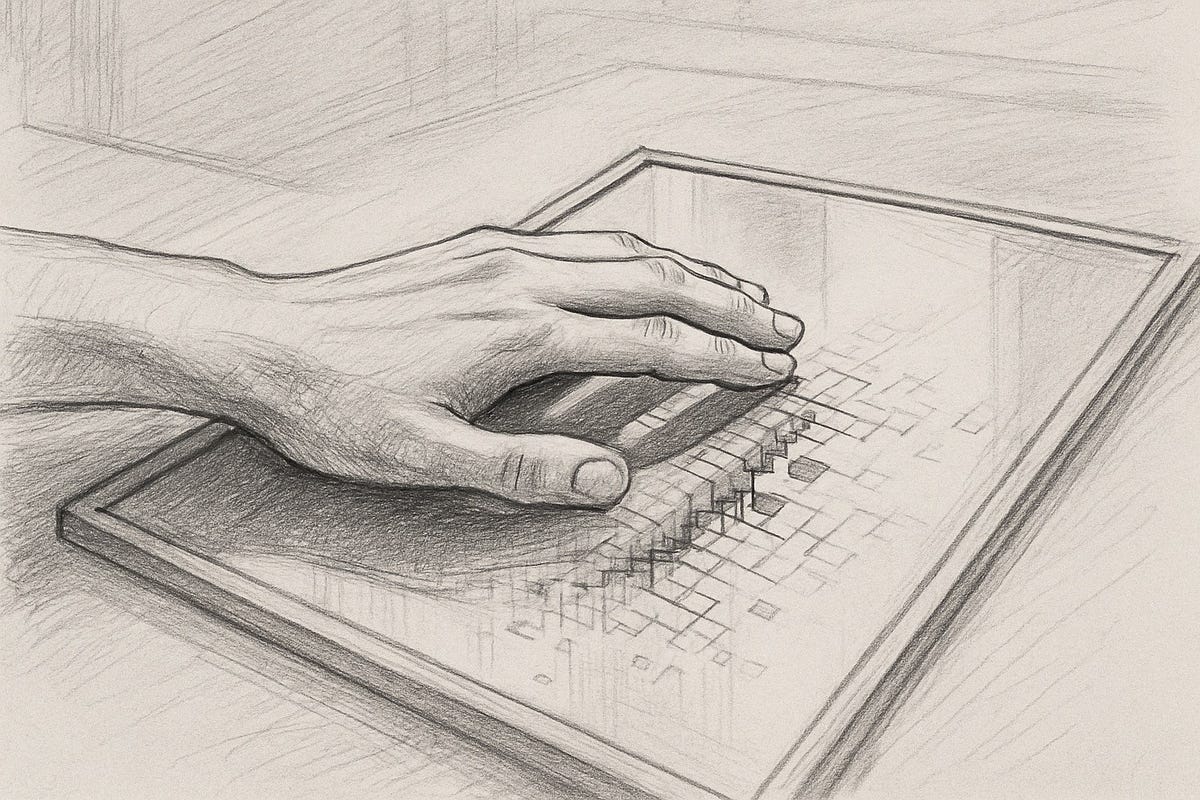
Viz
Become a subscriber receive the latest updates in your inbox.


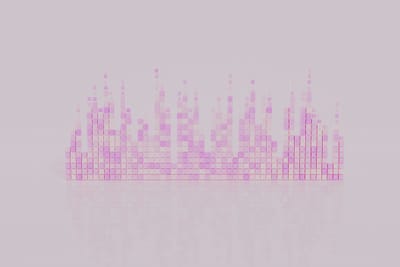

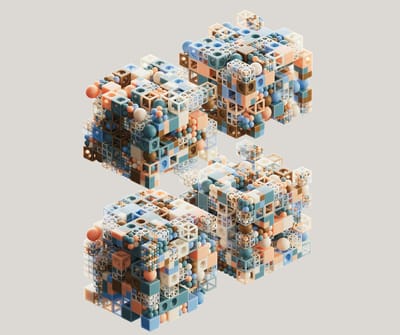
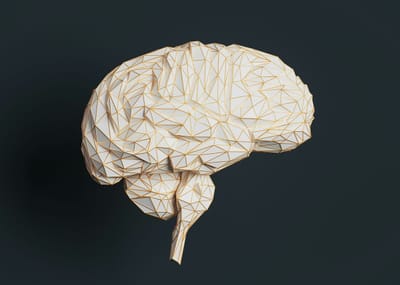
Member discussion